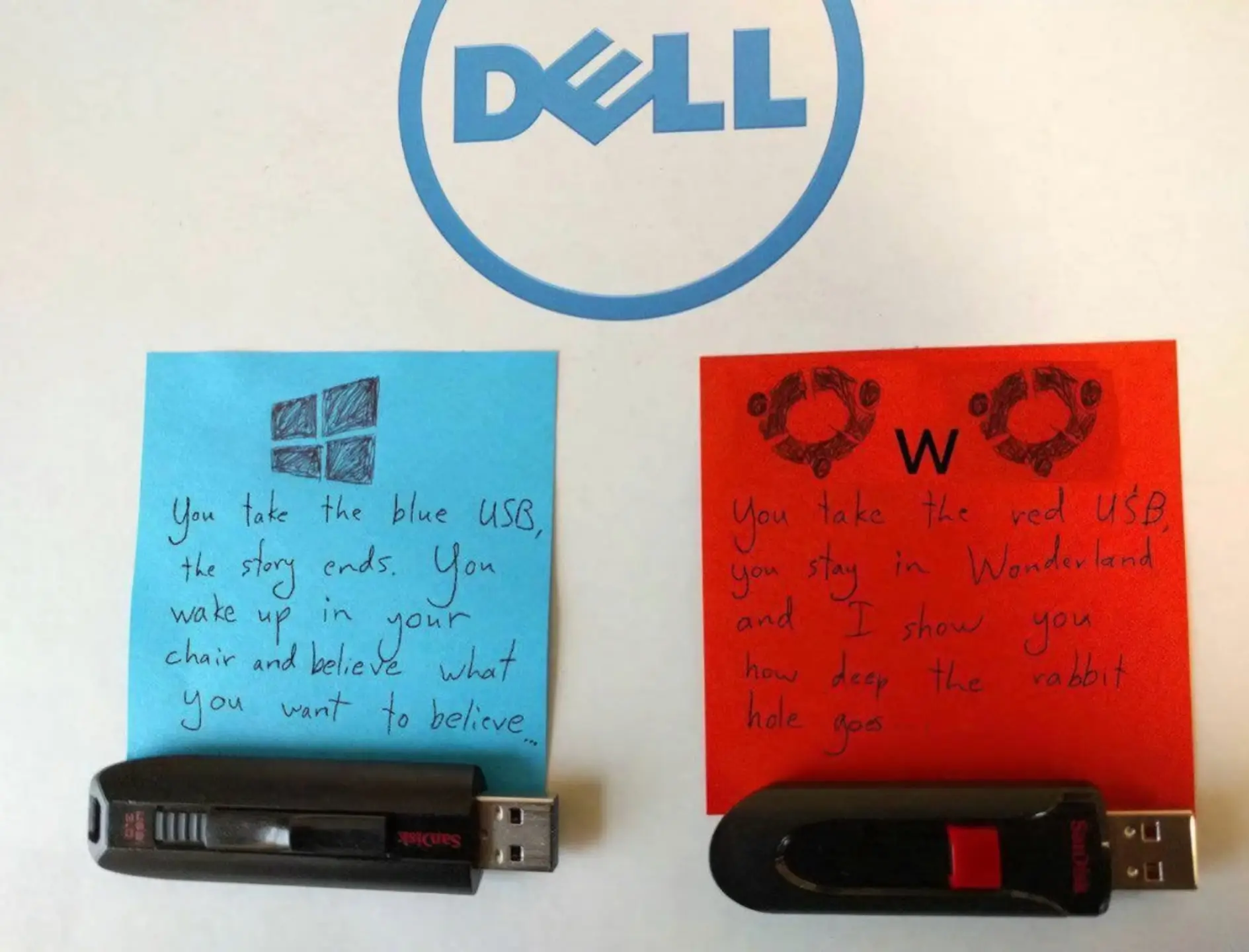It was a hole alright

It was a hole alright

The hole is Arch, btw.
I'd say Nixos is the real hole 😄
Me trying to switch to arch today frfr. 4 hours straight of errors because I don't know what the fuck I'm doing

It should be VIM
No one comes back from VIM.
Those who say they have are dirty liars... or have it paused in the background.
...or eventually convert to the cult of Emacs.
When I use Emacs, it's with Evil.
I use emacs as my lemmy client
Am the the only weirdo who swapped over to Linux without knowing a ton about it, and didn't really have any issues? I just started with a Windows-user-friendly distro (Mint Cinnamon), and then just looked up how to get through any weird (to me) issues that I encountered over time. Gradually learned more about what's under the hood as I went.
But I see these memes and stories about "I tried Linux, it lasted a week and I went back to Windows" here and there.
It's not scary. Am I missing something? XoD
I guess you either picked a distro that isn't stupid about drivers or you don't play a lot of those anticheat games (most of which are trashy anyway).
Personally I've always had less problems with Linux. Windows gets in your way and tries to slow you down every chance it gets. If something goes wrong your chances of fixing Windows without a reinstall are really slim. On Linux, it's more viable to actually fix it which saves you weeks of your time. Reinstalling all my Windows shit every year was such an awful chore. sfc /scannow my ass, that shit never fixed anything
Nah, I think if you used a distro like mint on most hardware your experience is completely reasonable.
I started playing around with Nixos (seasoned Linux user).. That's a real hole though. Not hard. Just different. And weird. Very cool, but still quite a bit rough around the edges.
I took the dark path when Vista became thing. With zero technical knowledge, I turned to Linux, with no regrets.
My entry way was SUSE, which was a shock, with KDE and a radically user experience from WinXP, my former daily driver for many, many years; I was an unashamed fanboy.
My next and final distro was Debian, when Debian was everything but user friendly. But Debian gave me a sense of control over my computer, which Vista had very proudly took away, while gobling away resources from a not so powerful machine.
That computer stayed home for about eight years, when it died, beyond any viable repair.
Debian stayed, although I admit I've been using Mint lately, mainly to accomodate for playing GOG games with the least stress.
But I'm a Debian person, no doubt about.
And I am the kind of person that spins his laptop at someone sporting a Debian-based distro and utters "I am your father."
My friends never followed me.
I'm alone in the dark (mode).
Your friends lived happily ever after.
Either that or they can't figure out how to close vim.
Oh no. Trapped in vim for the remainder of history.
Im about to take the same plunge into Linux. Any tips for a new comer?
There are no wrong answers, don't listen to people saying "this is better" or "do it this way". Maybe it'll help, but maybe it'll make you not like the community. If that's the way you feel, just do whatever you need to to get something to work.
There's a lot of choice, so make a choice and stick to it, but at the same time be open to change.
Also make backup of your data
Also make backup of your data
Maybe there are no wrong answers, but there are definitely some answers that are more correct than others. This is the most correct answer.
don't listen to people who tell you to
rm -rf --no-preserve-root /
Ignore the folks with way too much time on their hands who tie their self-worth to their ability to install Arch or whatever. Just use Ubuntu*; it's fine.
Once you install it, just use it like the normal desktop OS that it is. There's no need to immediately go down a !unixporn rabbit-hole just because the customizability of the system facilitates it. If something you need doesn't work or otherwise bothers you, fix it, but otherwise leave the system alone and just let yourself get used to it with default stuff.
By the time you get done with step 2, you'll be able to know for yourself what you want to do next.
Unnumbered: Gradually come to understand that the terminal is your friend, not something to be intimidated by. You shouldn't need to use it (not with Ubuntu, anyway), but if you give it a chance you'll eventually find yourself wanting to use it because of the advantages it has, such as using the history to have a perfect record of what you did, executing a complicated sequence of commands perfectly by pasting them in instead of trying to manually follow instructions clicking around in a GUI, and creating pipelines and scripts to do complicated things (say, batch-renaming files) relatively easily.
In particular, try to understand the essential nature of UNIX: "Think of the UNIX system programs as... the building blocks with which you can create things. And the thing that distinguishes the UNIX system from any other system is the degree to which those building blocks can be glued together in a variety of different ways -- not just obvious ways but in many cases very unobvious ways -- to get different jobs done"
(* Yes, specifically Ubuntu, not a "similar" distro like Debian or Mint or Pop! OS (let alone a dissimilar one like Arch or CentOS or Slackware). You want the distro that things like Steam officially support, not one that they unofficially work on. Picking a different "flavor" of Ubuntu that uses a different UI, like Kubuntu or Xubuntu, is fine though.)
If you accidentally open 'vi', an escape sequence is ':wq'
You can also type :x to write and quit. Just imaging the amount of time saved not pressing one extra letter. ^Could save your life.^
Don't start out with the stuff that experienced people use, you'll just get frustrated if you do.
My first experience was that windows got on my nerves so much I said "fuck it, I'll just learn linux". And I've been learning ever since. Just using linux as a desktop OS and figuring stuff out along the way is a great way to learn the basics.
If you do dual boot, check 10 times that you are installing to the correct drive/partition.
Since Linux uses a different drive naming scheme than Windows, it's super easy to accidentally install Linux on the partition where you actually wanted to keep your Windows.
What kind of platform are you working with? laptop? desktop? RPi?
You can run Linux on trash hardware. If you have the option, start by installing Linux on something that is not your daily use computer, like an old laptop.
If you can't do that, then consider getting a second hard drive and installing Linux on that so you don't have to mess with your primary OS install.
If you can't do that, then at least prepare a USB drive/DVD installer for your primary OS (presumably Windows) now before you make any changes to your computer. Boot the installer once to make sure it works before you need it.
And before you do anything else back up your important files to an external storage of some type.
It's extremely useful to have a second working computer to use for doing research and downloading files/installers/recovery tools as needed. Your phone isn't good enough because you won't be able to create an OS install drive from it if you need to.
Don't fixate on/rush switching. Even before using Linux, identify what software you need that doesn't support Linux, find multi-platform (+FOSS) alternatives and attempt to gain comfort/proficiency with them. (I wholeheartedly recommend Krita, personally I have used it for pixel art and image editing on top of normal art) WINE sometimes works, but native feels much better and switching makes more sense when you have a known-good system to switch over to.
If you remember to consider limitations, there are a few methods to try Linux (LiveCD, VM, spare hardware etc). If you have a desktop you can remove your Windows drive (particularly w/SATA) for a step more cautious than just dual-booting.
Obligatory xkcd: https://xkcd.com/456

Never ending #nerdsnipe !

If he were doing it for real he would build the stairs himself.
Damn, this meme slaps so hard. I didn't chase any friends down there, but I thought it sounded like a secret nerd club that I wanted to be a part of. Using Linux is a part of my daily life now, professionally and personally, 10 years later.
Oh the horror! I have a laptop running Linux! Two laptops even!!!
Somebody help me!
Windows is too bloated to run on said laptops. On one, during it's life, it could barely do an update! I eventually wiped Windows and put Linux on it. It worked fine, just not very fast. I mean 4Gbytes is a bit of a squeeze.
Hint: :q!
Sister communities:
Community rules (click to expand)
1. Follow the site-wide rules
sudo in Windows.Please report posts and comments that break these rules!
Important: never execute code or follow advice that you don't understand or can't verify, especially here. The word of the day is credibility. This is a meme community -- even the most helpful comments might just be shitposts that can damage your system. Be aware, be smart, don't remove France.